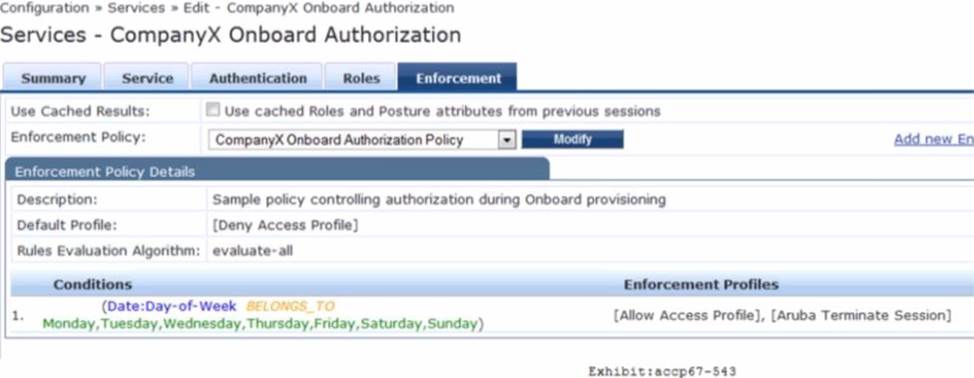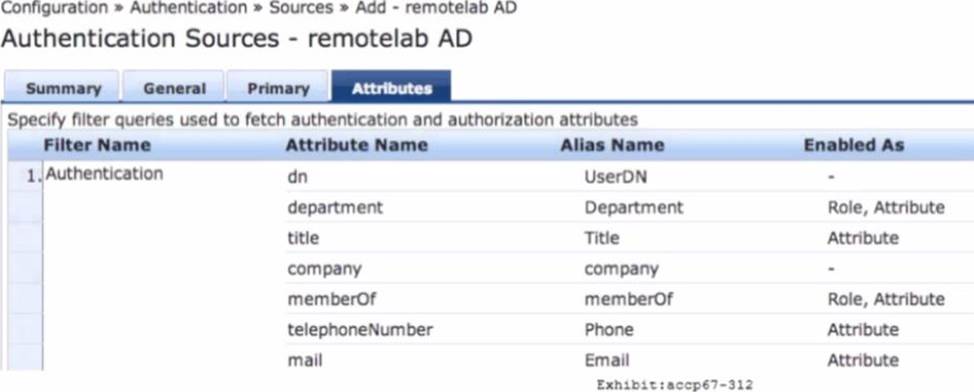cWhich technologies can prevent split brain in a VSF fabric that includes Aruba 2930F switches?
- A . ARP MAD or OOBM MAD
- B . VLAN MAD or ARP MAD
- C . OOBM MAD or LLDP MAD
- D . LLDP MAD or VLAN MAD
Refer to the exhibit.

Based on the configuration of the Enforcement Profiles In the Onboard Authorization service shown, which Onboarding action will occur?
- A . The device will be disconnected from the network after Onboarding so that an EAP-TLS authentication is not performed.
- B . The device will be disconnected from and reconnected to the network after Onboarding is completed.
- C . The device’s onboard authorization request will be denied.
- D . The device will be disconnected after post-Onboarding EAP-TLS authentication, so a second EAP-TLS authentication is performed.
- E . After logging in on the Onboard web login page, the device will be disconnected form and reconnected to the network before Onboard begins.
Refer to the exhibit.

Based on the Attribute configuration shown, which statement accurately describes the status of attribute values?
- A . Only the attribute values of department and memberOf can be used in role mapping policies.
- B . The attribute values of department, title, memberOf, telephoneNumber, and mail are directly applied as ClearPass.
- C . Only the attribute value of company can be used in role mapping policies, not the other attributes.
- D . The attribute values of department and memberOf are directly applied as ClearPass roles.
- E . Only the attribute values of title, telephoneNumber, and mail can be used in role mapping policies.
An administrator wants to use Airwave to manually add devices on the network.
Where should the administrator perform this action?
- A . in Device Setup
- B . in Groups
- C . in AMP Setup
- D . in Devices
Refer to the exhibit.
Switch-1 and Switch-2 connect on interface A23. The switches experience a connectivity issue. The network administrator sees that both switches show this interface as up. The administrator sees the output shown in the exhibit on Switch-1.
What is a typical issue that could cause this output?
- A . a hardware issue, such as a broken cable
- B . asymmetric routing introduced by a routing configuration error
- C . an issue with queuing, caused by mismatched QoS settings
- D . mismatched IP addresses on the VLAN for the link
An administrator supports a RAP to a branch office. Employees at the branch office connect to an employee SSID that allows for split tunneling of the employee traffic. The RAP initially connects to the corporate office controller, but later loses connectivity to it.
Which operating mode should the administrator configure for a secondary SSID to be advertised during the loss of connectivity?
- A . Standard
- B . Persistent
- C . Always
- D . Backup
Refer to the exhibit.
Based on the configuration for the client’s certificate private key as shown, which statements accurately describe the settings? (Select two.)
- A . More bits in the private key will increase security.
- B . The private key for TLS client certificates is not created.
- C . The private key is stored in the ClearPass server.
- D . More bits in the private key will reduce security.
- E . The private key is stored in the user device.
Refer to the exhibit.
Based on the Policy configuration shown, which VLAN will be assigned when a user with ClearPass role Engineer authenticates to the network successfully on Saturday using connection protocol WEBAUTH?
- A . Deny Access
- B . Employee VLAN
- C . Internet VLAN
- D . Full Access VLAN
An administrator creates service-based policies for AirGroup on the Mobility Master (MM).
The administrator can define location-based policy limits based on which information?
- A . AP names, AP groups, controller names, and controller groups
- B . AP Fully Qualified Location Names (FQLNs) and controller Fully Qualified Domain Names (FQDNs)
- C . AP names, AP groups, and AP Fully Qualified Location Names (FQLNs)
- D . Controller names, controller groups, and controller Fully Qualified Domain Names (FQDNs)
A network administrator can set the OSPF metric-type on an AOS-Switch to Type 1 or Type 2.
What is the difference?
- A . A Type 2 metric marks external routes that can be advertised in NSSAs, while a Type 1 metric marks external routes that can only be advertised in normal areas.
- B . A Type 2 metric assigns cost 1 to a 100 Gbps link, while a Type 1 metric assigns cost 1 to all links of 100 Mbps or higher.
- C . A Type 2 metric is assigned to multiple external routes that are aggregated together, while a Type 1 metric does not permit external route aggregation.
- D . A Type 2 metric stays the same as the external route is advertised, while a Type 1 metric increments with internal OSPF link costs.
Which protocol do Mobility Controllers (MCs) use to detect a failed Mobility Master (MM)?
- A . VRRP
- B . SNMP
- C . PAPI
- D . IPSec
A company requires AOS-Switches at the campus core. The switches:
✑ Will act as the default gateways for several campus VLANs
✑ Must provide redundancy for their services and tolerate the loss of a link or an entire switch
✑ Must recover from the failure of one of the switches within a second or less
VRRP and MSTP are proposed to meet these requirements.
What is an issue with this proposal?
- A . VRRP provides redundancy against lost links but not a failed switch.
- B . VRRP provides routing redundancy but not default gateway redundancy.
- C . VRRP does not interoperate with MSTP.
- D . VRRP takes longer than a second to fail over.
Refer to the exhibit.
An administrator implements AP licensing on a Mobility Master (MM).
• Each campus is responsible to purchase its own AP licenses.
• There are 900 AP licenses deployed in the global pool
• There are three dedicated pools.
• From the global pool, 300 AP licenses are assigned to each dedicated pool.
Network engineers at CampusA want to deploy an additional 100 APs. Currently all of the AP licenses in CampusA and CampusB are allocated, but only 200 of the AP licenses m CampusC are allocated.
What can the administrator do to add capacity for CampusA in alignment with campus policies?
- A . Allow CampusA to share from the CampusC pool.
- B . Add 100 more AP licenses and assign them to the CampusA pool.
- C . Move 100 licenses from the CampusC pool to the global pool.
- D . Add 100 more AP licenses to the global pool.
What must an OSPF router do when it receives a link state update?
- A . It must participate in a new election for the Designated Router and Backup DR.
- B . It must initiate a graceful restart timer.
- C . It must re-establish adjacency with its Designated Router and Backup DR.
- D . It must run the shortest path first algorithm.
Refer to the exhibit.
A company has attempted to implement OSPF without success. The devices in Area I need to be able to reach Area 2. Routes should be aggregated for advertisement in other areas.
What must be changed to meet these requirements?
- A . Change Area 3 to Area 0; remove Area 1 from Switch-2 and Area 2 from Switch-1.
- B . Add the 10.2.0.0/16 range on Swttch-1 and the 10.1.0.0/16 range on Switch-2.
- C . Add Area 1 and Area 2 on VIAN 100 on both Switch-1 and Switch-2. Remove Area 3.
- D . Move the 10.1.0.0/16 range to Area 2 on Switch-1 and the 10.2.0.0/16rangetoArea 1 onSwitch-2.
Refer to the exhibit.
Several interfaces on an AOS-Switch enforce 802. IX to a RADIUS server at 10.254.378.521. The interface 802. IX settings are shown in the exhibit, and 802. IX is also enabled globally. The security team have added a requirement tor port security on the interfaces as well.
Before administrators enable port security, which additional step must they complete to prevent issues?
- A . Set an 802. l X client limit on the interfaces.
- B . Manually add legitimate MAC addresses to the switch authorized MAC list.
- C . Enable eavesdropping protection on the interfaces.
- D . Enable DHCP snooping on VLAN 20.
in a VPN that uses certificate-based authentication, which component must be configured on the Mobility Master (MM) to allow a RAP to successfully connect to a Mobility Controller (MC)
- A . RAP VPN username and password
- B . WLAN and new RAP group
- C . RAP IPSec pre-shared key
- D . RAP whitelist
An administrator implements the MultiZone feature and uses two clusters that utilize CPSec. A primary and a data zone are created. MultiZone APs successfully build sessions to the primary cluster but fail to establish sessions to the data zone cluster.
What must the administrator do to solve this problem?
- A . Enable CPSec in the MultiZone profile for both the primary and data zone.
- B . Enable MultiZone booting in the MultiZone AP apboot configuration mode.
- C . Add the MultiZone APs to the data zone’s CPSec whitelist.
- D . Use different AP Group names for the two zones.
CORRECT TEXT
Which is a valid policy simulation types in ClearPass? (Select three.)
- A . Enforcement Policy
- B . Posture token derivation
- C . Role Mapping
- D . Endpoint Profiler
- E . Chained simulation
Refer to the exhibit.
An AD user’s department attribute is configured as *HR". The user connects on Monday using their Windows Laptop to a switch that belongs to the Device Group HQ.
Which role is assigned to the user in ClearPass?
- A . Executive
- B . iOS Device
- C . Vendor
- D . Remote Employee
- E . HR Local
